Block of Wikipedia in Turkey
From 29 April 2017 to 15 January 2020, the online encyclopedia Wikipedia was blocked in Turkey. On 29 April 2017, Turkish authorities blocked online access to all its language editions throughout the country.[1][2] The restrictions were imposed by Turkish Law No. 5651,[3] due to the English version's article on state-sponsored terrorism (in the version of 29 April 2017), where Turkey was described as a sponsor country for ISIS and Al-Qaeda, which Turkish courts viewed as a public manipulation of mass media.[4] Requests by the Turkish Information and Communication Technologies Authority to edit several articles to comply with Turkish law were not acted on.
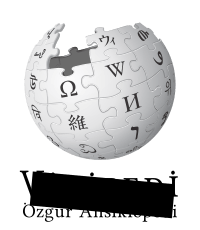
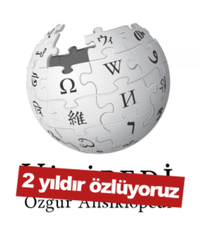
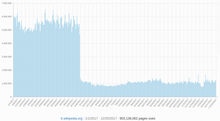
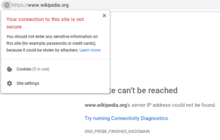
Wikimedia Foundation Executive Director Katherine Maher said in May 2018 that the Foundation was "not sure why there is still a ban".[5] In March 2018 Wikipedia's Facebook page started the "We Miss Turkey" (Turkish: Özledik) campaign and replaced the black censor bar over the Wikipedia logo with a red one. It also had an accompanying hashtag of the same name.[6]
On 26 December 2019, the Constitutional Court of Turkey ruled that the block of Wikipedia violated human rights and ordered it to be lifted.[7] On 15 January 2020, the block of Wikipedia in Turkey was lifted.[8][9][10]
Background
Some countries have faulted Turkey for funding Islamist rebel groups in Syria, including al-Qaeda's affiliate in Syria, the al-Nusra Front.[11][12] In October 2014, U.S. Vice President Joe Biden said that Turkey, Saudi Arabia and the UAE had "poured hundreds of millions of dollars and tens of thousands of tons of weapons into anyone who would fight against Al-Assad".[13]
The block occurred on 29 April 2017, two weeks after the Turkish constitutional referendum, which was held on 16 April.
On 25 April, Turkey conducted several airstrikes on YPG, YPJ, and PKK facilities in both Syria and Iraq (Sinjar). 40 militants, including five Peshmerga soldiers, were killed at Iraq's Sinjar Mountains, and more than 20 YPG and YPJ fighters were killed on Syria's Mount Karakoc.[14] The Syrian Democratic Forces (SDF) threatened to withdraw from the operation to capture Raqqa if the United States did not take measures to stop Turkey's airstrikes against the group.[15] In response, the US began to patrol the border alongside SDF troops in order to force a ceasefire between its two allies.[16][17]
On 26 April, continuing the purges that started in 2016, 1,009 police officers were detained based on accusations of being secretly involved with the Gülenist network within the Turkish police force.[18] 9,100 officers have been suspended.[19][20] On 29 April, 3,974 more civil servants were dismissed. Media outlets and reporters were heavily targeted; 190 news organizations were banned and at least 120 journalists were imprisoned.[21] Together with the ban of Wikipedia and television dating game shows, The New York Times described the moves as "an expand[ing] crackdown on dissent and free expression".[22]
Legal context
Law No. 5651, known as the Internet Act (IA), was enacted on 4 May 2007.[23] The purpose of this law was described by the now-defunct Presidency of Telecommunication and Communication as follows: "There are two reasons for the law to be brought. The first reason: to determine the liability and the responsibility of collective use providers, access providers, location providers, and content providers, which are the main actors of the Internet. The other reason is to determine the procedures and fundamentals related to the specific crimes committed over the Internet and fighting these through content, location and access providers."[24] More recently, the law has been used to censor individuals, journalists and the media.[25] As of June 2017, at least 127,000 websites are estimated to have been blocked in Turkey, along with another 95,000 individual web pages.[21] According to the 2018 Web Report of the Freedom of Expression Association (İfade Özgürlüğü Derneği) access to 245,826 websites was blocked in Turkey by the end of 2018. Access to a total of 54,904 websites and domain names was blocked only in 2018.[26]
Block
On the morning of 29 April 2017, following news from Turkey Blocks that all language editions of Wikipedia had been blocked in Turkey,[1] several websites published articles about the event.[27] Reuters and the BBC reported that the Turkish authorities had blocked all access to Wikipedia in the country beginning at 5:00 AM GMT. Turkey's Information and Communication Technologies Authority simply stated: "After technical analysis and legal consideration based on the Law Nr. [sic] 5651 [governing the internet], an administrative measure has been taken for this website."[28][2] Users reported that they could only access Wikipedia using tools such as private VPNs.[29][30]
Deep packet inspection was one of the methods used to block access to Wikipedia.[31]
Rationale and demands
Voice of America reported that Turkish media had explained the block was a result of "terror-related content".[32] Referring to an email statement made by the Transport, Maritime Affairs and Communications Ministry, Turkish News source Anadolu Agency reported that the block was due to its articles and comments describing Turkey's alleged involvement with terror groups. The ministry said, "Instead of coordinating against terrorism, it has become part of an information source which is running a smear campaign against Turkey in the international arena."[33]
After court objection by Bilgi University professor Yaman Akdeniz, the Ankara 2nd Civil Court of Peace said that the causes of the block were the following articles on the English Wikipedia:[34]
On 11 May 2017, Turkish Transport Minister Ahmet Arslan cited Wikipedia's featuring "content creating a perception that Turkey is supporting terrorist organizations" as a reason for the block.[35]
According to a BBC report, the Hürriyet daily newspaper said that Ankara had asked Wikipedia to remove the offending content, adding that the access ban would be lifted if Wikipedia met Turkey's demands.[2] Later in the day, the provisional "administrative measure" was replaced by a court order, issued by the Ankara 1st Criminal Court of Peace, blocking Wikipedia as a "protective measure".[1]
According to a report by the Anadolu Agency, the country "has a history of demanding that international websites take such steps as having a representative office in the country, complying with principles of international law, implementing court rulings, and not being part of any smear campaign or operation in Turkey".[33]
On 3 May 2017, the Wikimedia Foundation submitted an objection to the block to Ankara's 1st Penal Court of Peace,[36] but it was rejected by the court on 5 May.[37] The ruling stated that the country-wide block would continue as the "offending" pages had not been removed. The head of Turkey's Information and Communication Technologies Authority, Omer Fatih Sayan, explained: "It is not possible to open access to Wikipedia so long as the decisions are not implemented."[38] The same day, the Information and Communication Technologies Authority (BTK) published the following official statement:[39]
- Despite all the efforts, the content that falsely claims Turkey's support for terrorist organizations was not removed from Wikipedia.
- This content was not allowed to be edited with accurate information.
- Since Wikipedia broadcasts in HTTPS protocol, it is technically impossible to filter by individual URLs to block only relevant content.
- Therefore, the entire Wikipedia content had to be filtered.
- Wikipedia editors must do what is necessary for this and similar content.
Withdrawal of Jimmy Wales' invitation
On 2 May 2017, Istanbul Municipality removed Jimmy Wales, the founder of Wikipedia, from the guest list at the World Cities Expo event on smart cities to be held in the city from 15 to 18 May 2017, making the following announcement: "Wikipedia founder Jimmy Wales was disinvited [sic] from the 'World Cities Expo Event' and the decision has been communicated to him. Respectfully announced to the public."[40] Wales had hoped to attend despite the Wikipedia block, commenting: "I am looking forward to the visit. Istanbul is one of my favorite cities."[41][42]
Reactions
Republican People's Party (CHP) parliamentarians criticized the block, with Eren Erdem stating that the ban puts "Turkey in line with North Korea" and Barış Yarkadaş calling it "censorship and a violation of the right to access information".[43][44] In a tweet made on the first day of the block, Wikipedia co-founder Jimmy Wales expressed his support for those criticizing the decision as censorship, saying "Access to information is a fundamental human right. Turkish people I will always stand with you to fight for this right."[45][43][29][46] The Wikimedia Foundation, which runs Wikipedia, stated that it was committed to keeping the site available in Turkey and pushing for a "judicial review" of the decision.[47]
.jpg)
On 9 January 2018, Republican People's Party deputy Sezgin Tanrıkulu submitted a written parliamentary question regarding the block of Wikipedia, saying that it was against the Turkish constitution and European Convention on Human Rights, and that "the block should be partial according to Turkish laws". Minister of transport, maritime and communication Ahmet Arslan denied that Wikipedia was blocked completely and stated that the Wikipedia block was just partial due to Article 22 of the Constitution of Turkey and Article 10 of the European Convention on Human Rights.[48]
NDTV said that the move caused strong reactions on social media against the decision to deny access to "one of the world's most popular websites".[49]
Six months into the block, Wikimedia Foundation Communication Director Juliet Barbara published an article about the efforts to remove the access ban.[50]
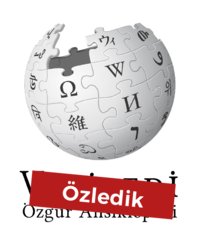
A year and a day into the block, on 30 April 2018, İYİ Party in a reference to the 2018 Turkish general election, vowed to host the "reopening of Wikipedia" with "all of Turkey's citizens" on the day after snap elections on 24 June.[51]
Muharrem İnce, CHP's presidential candidate for the 2018 Turkish presidential election, also vowed to reopen Wikipedia during one of his campaign speeches on 22 May 2018.[52] However, the election was won by the incumbent, Recep Tayyip Erdoğan.
Circumvention
Reading
Viewing Wikipedia content that is not Turkish was possible with use of the Opera browser, as it has a built-in VPN. Alternatively the Turkish- and English-language mirror website TurkceWiki.org, which is unaffiliated with the Wikimedia Foundation, was among several Wikipedia mirrors available to Turkish users unable to access Wikipedia.[53] This mirror site, nevertheless, omitted the "offending" sections that the Turkish authorities wanted removed from Wikipedia[54][55] and some features such as the left sidebar.
Activists also created a copy of Turkish Wikipedia on the InterPlanetary File System (IPFS)—a way of addressing web content which the Turkish government could not block due to its usage of decentralized open-source technology.[56][57][58]
Editing
As of 2019, it was possible to update Wikipedia by evading the block with one of the virtual private networks (VPNs) which are not blocked[59] and thus a domain name server (DNS) outside Turkey. An IP block exemption from Wikipedia was also required.
Litigation
Both the Wikimedia Foundation as well as some users (academics and activists Yaman Akdeniz and Kerem Altıparmak) of the platform challenged the blocking decision of the Ankara 1st Criminal Judgeship of Peace. All the appeals were rejected by the Ankara 2nd Criminal Judgeship of Peace. Therefore the initial blocking decision become final.[60][61] Therefore the Wikimedia Foundation as well as the academics Yaman Akdeniz and Kerem Altıparmak lodged separate individual applications with the Constitutional Court of Turkey.[62] Unlike in previous applications involving the Twitter and YouTube platforms, the Constitutional Court did not issue a swift judgment and for almost 2.5 years there was no development whatsoever involving the individual applications lodged with the Constitutional Court.
Because of the delays, in May 2019, the Wikimedia Foundation filed an application with the European Court of Human Rights (ECHR), stating that the ban was "a violation of the right to freedom of expression". The Foundation was represented by English barrister Can Yeginsu and Turkish attorney Gönenç Gürkaynak.[63][64] In July 2019, the Wikimedia Foundation published a post on their social media accounts, announcing that the ECHR had expedited the case.[65] Later in August, the ECHR announced that it had given Turkey until the end of October to justify the ban.[66] The Constitutional Court of Turkey (AYM) weighed in on the issue on 11 September 2019 to decide whether the ban was in violation of the freedom of expression or not.[67] A pro-government journalist later stated that the court had considered rescinding the ban.[68] At the end of October, the ECHR gave Turkey an additional six weeks to work on any potential justification that they might have for this ban.[69] On 25 November 2019, Dunja Mijatović, the Commissioner for Human Rights, declared the blocking "unacceptable in a democratic society and not compatible with Article 10 of the European Convention on Human Rights which protects freedom of expression".[70] The General Assembly of the Constitutional Court of Turkey announced that the case would be reviewed on 26 December 2019 during their meeting.[71] On 26 December 2019, the court ruled in a 10–6 vote that the block of Wikipedia violated the freedom of expression and ordered it to be lifted immediately.[72][73][7]
The ICTA announced that they would open the site after the court's decision, however, Yaman Akdeniz, a law professor and one of the applicants in the Wikipedia case from Istanbul Bilgi University, said that a full opinion "most likely [needed] to be published" before the ban was lifted.[74][75] The Turkish government was expected to submit its written observations to the ECHR in January 2020.[76]
Restoration of access

After the Constitutional Court's decision in December 2019, overruling the initial ban, Turkish authorities granted users access to Wikipedia on late 15 January 2020 (Wikipedia's 19th birthday). The decision was officially announced on T.C. Resmî Gazete on the same day.[77][78]
On 16 January 2020, the Wikimedia Foundation issued a press release which included the following statement:
We are thrilled that the people of Turkey will once again be able to participate in the largest global conversation about the culture and history of Turkey online and continue to make Wikipedia a vibrant source of information about Turkey and the world
— Wikimedia Foundation, press release (16 January 2020)
See also
References
- "Wikipedia blocked in Turkey". Turkey Blocks. 29 April 2017. Archived from the original on 1 May 2017. Retrieved 29 April 2017.
- "Turkish authorities block Wikipedia without giving reason". BBC News. 29 April 2017. Archived from the original on 29 April 2017. Retrieved 29 April 2017.
- "İNTERNET ORTAMINDA YAPILAN YAYINLARIN DÜZENLENMESİ VE BU YAYINLAR YOLUYLA İŞLENEN SUÇLARLA MÜCADELE EDİLMESİ HAKKINDA KANUN" [Turkish law based ban of Wikipedia] (PDF). mevzuat.gov.tr (in Turkish). Archived (PDF) from the original on 8 August 2017. Retrieved 2 August 2017.
- Benjakob, Omer (26 April 2018). "Revealed: The Four Articles That Got Wikipedia Banned in Turkey". Haaretz. Retrieved 15 January 2020.
- "Wikipedia 'still not sure' why it is still banned in Turkey". Hurriyet. Istanbul. 17 January 2018. Archived from the original on 16 May 2018. Retrieved 17 January 2018.
- "Wikipedia'dan kampanya: Türkiye'yi özledik". NTV.com.tr (in Turkish). 6 March 2018. Archived from the original on 6 March 2018. Retrieved 11 April 2018.
- McKernan, Bethan (26 December 2019). "Turkey's Wikipedia block violates human rights, high court rules". The Guardian. Archived from the original on 26 December 2019. Retrieved 26 December 2019.
- "Wikipedia ban to be lifted after top court ruling issued". Daily News. Retrieved 15 January 2020.
- "Wikipedia erişime açıldı, ancak BTK'nın uyguladığı bir karar bulunamıyor". Diken. 15 January 2020. Retrieved 15 January 2020.
- "Özlemiştik: Wikipedia, Türkiye'de Tekrar Erişime Açıldı". Webtekno. Retrieved 15 January 2020.
- "Joe Biden apologised over IS remarks, but was he right?". BBC News. 7 October 2014. Archived from the original on 20 October 2019. Retrieved 10 October 2019.
- Kim Sengupta (12 May 2015). "Turkey and Saudi Arabia alarm the West by backing Islamist extremists the Americans had bombed in Syria". The Independent. Archived from the original on 13 May 2015. Retrieved 19 September 2017.
- "Joe Biden Is the Only Honest Man in Washington". Foreign Policy. 7 October 2014. Archived from the original on 15 December 2019. Retrieved 10 October 2019.
- "Turkey may hit YPG in Syria 'all of a sudden': President Erdoğan". Hürriyet Daily News. 30 April 2017. Archived from the original on 16 October 2017. Retrieved 8 May 2017.
- "YPG threatens to withdraw from Raqqa ops amid Turkish attacks". NRT TV. 28 April 2017. Archived from the original on 16 August 2017. Retrieved 28 April 2017.
- Bilginsoy, Zeynep1; Deeb, Sarah El (29 April 2017). "Turkey, U.S. move armored vehicles onto either side of Syrian border". CP24. Archived from the original on 29 April 2017. Retrieved 29 April 2017.
- "Turkey attacks Rojava to impede anti-ISIS operations in Raqqa: Western SDF volunteer - ARA News". ARA News. 30 April 2017. Archived from the original on 29 April 2017. Retrieved 30 April 2017.
- Kingsley, Patrick (26 April 2017). "Over 1,000 People Are Detained in Raids in Turkey". The New York Times. ISSN 0362-4331. Archived from the original on 28 April 2017. Retrieved 29 April 2017.
- "Purges en Turquie : plus de 9 000 policiers suspendus". Le Monde (in French). 26 April 2017. ISSN 1950-6244. Archived from the original on 30 April 2017. Retrieved 29 April 2017.
- "Turkey fires 3,900 in second post-referendum purge". Reuters. 29 April 2017. Archived from the original on 29 April 2017. Retrieved 29 April 2017.
- Kingsley, Patrick (10 June 2017). "Turks Click Away, but Wikipedia Is Gone". The New York Times. Archived from the original on 13 June 2017. Retrieved 13 June 2017.
- Kingsley, Patrick (30 April 2017). "Turkey Purges 4,000 More Officials, and Blocks Wikipedia". The New York Times. ISSN 0362-4331. Archived from the original on 1 May 2017. Retrieved 30 April 2017.
- "Turkey: Law No. 5651 on Regulating Broadcasting in the Internet and Fighting Against Crimes Committed through Internet Broadcasting". WIPO. Archived from the original on 29 June 2017. Retrieved 29 April 2017.
- Presidency of Telecommunication, communication, PTC. "Information about the regulations of the content of the Internet". PTC. Archived from the original on 22 March 2014. Retrieved 22 March 2014.
- Yaman, Akdeniz; Kerem, Altiparmak (November 2008). Internet : restricted access : a critical assessment of Internet content regulation and censorship in Turkey (PDF). Imaj Kitabevi & Imaj Yayinevi. ISBN 9789758752652. OCLC 488655521. Archived (PDF) from the original on 17 July 2016. Retrieved 29 April 2017.
- "Engelli Web 2018 Report" (PDF). İfade Özgürlüğü Derneği.
- "Turkey blocks Wikipedia as threat to national security". Jurist. 29 April 2017. Archived from the original on 29 April 2017. Retrieved 8 May 2017.
- "Turkey blocks access to Wikipedia". Reuters. 29 April 2017. Archived from the original on 29 April 2017. Retrieved 29 April 2017.
- "Türkei blockiert Wikipedia-Zugang" (in German). Deutsche Welle. 29 April 2017. Archived from the original on 29 April 2017. Retrieved 29 April 2017.
- "Internet-Zensur unter Erdogan: Türkei blockiert Wikipedia". FOCUS Online (in German). 29 April 2017. Archived from the original on 3 May 2017. Retrieved 29 April 2017.
- "Middleboxes in Turkish telecom redirecting users to nation-state spyware". 14 March 2018. Archived from the original on 15 April 2019. Retrieved 15 April 2019.
- "Monitors: Turkey Blocks Access to Wikipedia". VOA. 29 April 2017. Archived from the original on 29 April 2017. Retrieved 29 April 2017.
- "Turkey: Wikipedia blocked for disregarding the law". Anadolu Agency. 29 April 2017. Archived from the original on 29 April 2017. Retrieved 29 April 2017.
- Yazıcıoğlu, Yıldız (3 May 2017). "Wikipedia Türkiye İçin 'Sansür' Uygulayacak mı?". Amerikanın Sesi (in Turkish). Archived from the original on 6 May 2017. Retrieved 6 May 2017.
- "Turkey warned Wikipedia over content, demands it open office: minister". Reuters. 11 May 2017. Archived from the original on 11 May 2017. Retrieved 14 May 2017.
- "Wikipedia takes the first legal step against Turkey's ban". Birgün Daily. 3 May 2017. Archived from the original on 9 May 2017. Retrieved 4 May 2017.
- "Wikipedia itirazı reddedildi". Ensonhaber (in Turkish). 5 May 2017. Archived from the original on 6 May 2017. Retrieved 5 May 2017.
- LeFebvre, Rob (5 May 2017). "Turkish court backs censorship of Wikipedia". engadget. Archived from the original on 9 May 2017. Retrieved 13 May 2017.
- BTK [@BTKbasin] (5 May 2017). "BTK official statement on twitter" (Tweet) – via Twitter. Retrieved 16 January 2020
- "Days after banning Wikipedia, Turkey disinvites founder from Istanbul expo". Turkey Purge. 2 May 2017. Archived from the original on 28 July 2017. Retrieved 3 May 2017.
- Can, Ahmet (2 May 2017). "Wikimedia Foundation appeals court ruling blocking Wikipedia in Turkey". Hürriyet Daily. Archived from the original on 2 October 2017. Retrieved 3 May 2017.
- "Istanbul cancels invite for Wikipedia founder Jimmy Wales after ban". Deutsche Welle. 2 May 2017. Archived from the original on 2 May 2017. Retrieved 3 May 2017.
- News, ABC (29 April 2017). "Turkish court formally blocks access to Wikipedia". ABC News. Archived from the original on 2 May 2017. Retrieved 29 April 2017.
- Bilginsoy, Zeynep. "Access to Wikipedia blocked by government in Turkey". Chicago Tribune. Archived from the original on 29 April 2017. Retrieved 29 April 2017.
- Wales, Jimmy [@jimmy_wales] (29 April 2017). "Jimmy Wales' response to Wikipedia ban in Turkey" (Tweet) – via Twitter.
- Wales, Jimmy [@jimmy_wales] (29 April 2017). "Jimmy Wales on Twitter" (Tweet) – via Twitter.
- "Turkey blocks Wikipedia over an alleged 'smear campaign'". Engadget. 29 April 2017. Archived from the original on 29 April 2017. Retrieved 29 April 2017.
- "Bakan Arslan'dan flaş Wikipedia açıklaması". yeniakit (in Turkish). Archived from the original on 9 June 2019. Retrieved 2 May 2018.
- "Turkish Authorities Block Access To Wikipedia: Monitor". NDTV. 29 April 2017. Archived from the original on 12 August 2019. Retrieved 29 April 2017.
- Barbara, Juliet. "Six months later: People of Turkey still denied access to Wikipedia". Wikimedia Vakfı. Archived from the original on 6 March 2018. Retrieved 7 November 2017.
- "İYİ Party vows to reopen access to Wikipedia if elected". Hurriyet Daily News. 30 April 2018. Archived from the original on 9 June 2019. Retrieved 30 April 2018.
- "You will tweet freely if I am elected: CHP candidate İnce". Hürriyet Daily News. Archived from the original on 9 June 2019. Retrieved 7 June 2018.
- "'Pirate' Wikipedia launched in Turkey after access ban - SCIENCE & TECHNOLOGY". Hurriyetdailynews.com. 13 September 2011. Archived from the original on 14 September 2017. Retrieved 13 September 2017.
- See article "Foreign involvement in the Syrian Civil War", Archived 28 December 2017 at the Wayback Machine; and article "State-sponsored terrorism", Archived 28 December 2017 at the Wayback Machine; – both articles on en.turkcewiki.org
- Geybullayeva, Arzu (29 June 2017). "Mirror Websites Are Helping Turkish Users Reconnect to Wikipedia". The Seattle Star. Archived from the original on 4 September 2017. Retrieved 22 July 2017.
- "Turkey Can't Block This Copy of Wikipedia". Observer. 10 May 2017. Archived from the original on 18 October 2017. Retrieved 14 May 2017.
- "Wikipedia'nın Engellenemeyen Türkçe Sürümü Yayına Girdi!". Webtekno (in Turkish). Archived from the original on 15 May 2017. Retrieved 14 May 2017.
- "Wikipedia'nın 'Engellenemeyen Türkçe Sürümünü' Çıkardılar!". entertusu.net (in Turkish). Retrieved 14 May 2017.
- "Best VPNs for Turkey: Which ones still beat VPN ban in 2019?". Comparitech Limited. Archived from the original on 3 May 2019. Retrieved 3 May 2019.
- "Bakan'dan Wikipedia açıklaması". Hürriyet. 9 May 2017. Retrieved 10 May 2017.
- "Mahkemeden Wikipedia kararı". Takvim. 5 May 2017. Retrieved 10 May 2017.
- "Wikipedia Anayasa Mahkemesi'ne başvurdu". NTV. 9 May 2017. Retrieved 10 May 2017.
- "Wikipedia petitions ECHR over Turkey ban". BBC. 23 May 2019. Archived from the original on 9 July 2019. Retrieved 23 May 2019.
- Pitel, Laura (23 May 2019). "Wikipedia takes Turkey to European human rights court". Financial Times. Archived from the original on 19 September 2019. Retrieved 23 May 2019.
- "The European Court of Human Rights has chosen to expedite our case to restore access to Wikipedia in Turkey, and defend free access to knowledge". Wikipedia. Instagram. 22 July 2019. Archived from the original on 17 December 2019. Retrieved 23 July 2019.
- "European court sets October deadline for Turkey to justify Wikipedia ban". Ahval. 21 August 2019. Archived from the original on 22 August 2019. Retrieved 11 September 2019.
- "Turkey's top court set to rule on Wikipedia ban". Ahval. 7 September 2019. Archived from the original on 9 September 2019. Retrieved 11 September 2019.
- "Turkey's top court set to rescind Wikipedia ban - pro-govt journalist". Ahval. 11 September 2019. Archived from the original on 11 September 2019. Retrieved 12 September 2019.
- "Türkiye'ye Wikipedia savunması için ek süre". Sözcü. 29 October 2019. Archived from the original on 5 November 2019. Retrieved 8 November 2019.
- "Commissioner publishes observations on internet blocking in Turkey". Commissioner for Human Rights. Archived from the original on 5 December 2019. Retrieved 5 December 2019.
- "Wikipedia (Vikipedi) açılıyor mu? Anayasa Mahkemesi görüşecek". Gözlem. 18 December 2019. Archived from the original on 20 December 2019. Retrieved 20 December 2019.
- "Turkey's top court says Wikipedia ban is violation of rights". Hürriyet Daily News. 26 December 2019. Archived from the original on 26 December 2019. Retrieved 26 December 2019.
- "Court rules Turkey violated freedoms by banning Wikipedia". AP NEWS. 26 December 2019. Archived from the original on 26 December 2019. Retrieved 26 December 2019.
- "Wikipedia (vikipedi) yeniden açılacak mı, tarih belli mi? Wikipedia nedir, neden yasaklandı?". Akşam. 27 December 2019. Archived from the original on 2 January 2020. Retrieved 1 January 2020.
- Zaveri, Mihir (26 December 2019). "Turkey's Ban on Wikipedia Is Unconstitutional, Court Says". The New York Times. Archived from the original on 28 December 2019. Retrieved 2 January 2020.
- "Wikipedia ban: Top court calls for Turkey to lift block". BBC News. 26 December 2019. Archived from the original on 31 December 2019. Retrieved 1 January 2020.
- "Erişim engelinin kaldırılmasına dair Anayasa Mahkemesinin gerekçeli kararı" (PDF). Resmi Gazete. 15 January 2020. Retrieved 15 January 2020.
- "Access to Wikipedia restored in Turkey after more than two and a half years" (Press release). Wikimedia Foundation. 16 October 2020. Retrieved 16 January 2020.
External links
| Wikinews has related news: |
- European Councils's Venice Commission's Opinion on Law No. 5651
- Wikimedia Foundation urges Turkish authorities to restore access to Wikipedia, Response by the Wikimedia Foundation (WMF)
- Response to 2017 ban in Turkey, Response by the Wikimedia community that complements the WMF response
- Project on Hindi Wikipedia where Wiki-contributions on Turkey were made showing solidarity with Turkish Wikipedians
- TurkceWikipedia.org – A "pirate" website mirroring Wikipedia's Turkish- and English-language content
- Revealed: The Four Articles That Got Wikipedia Banned in Turkey, article in Haaretz